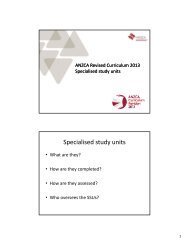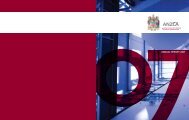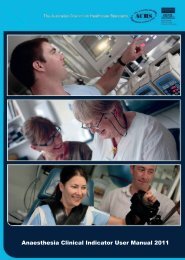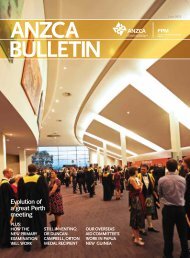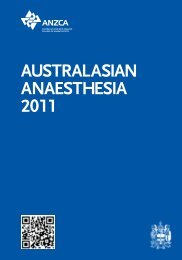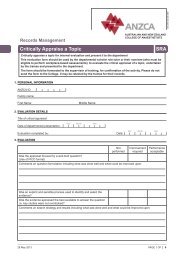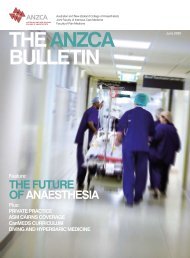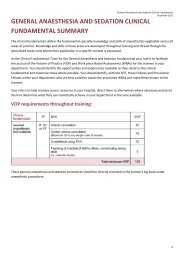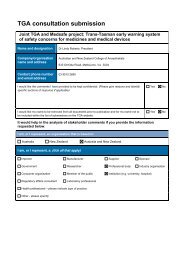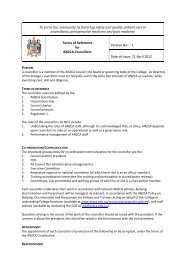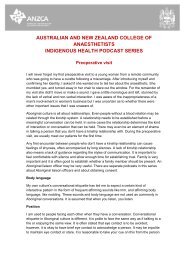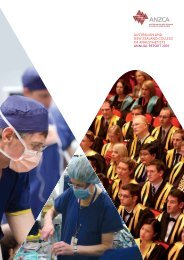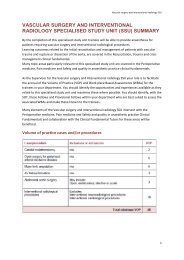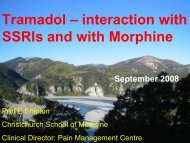ANZCA Bulletin June 2011 - Australian and New Zealand College of ...
ANZCA Bulletin June 2011 - Australian and New Zealand College of ...
ANZCA Bulletin June 2011 - Australian and New Zealand College of ...
You also want an ePaper? Increase the reach of your titles
YUMPU automatically turns print PDFs into web optimized ePapers that Google loves.
Indigenous Health<br />
Committee<br />
<strong>ANZCA</strong>’s Indigenous Health<br />
Committee was established<br />
at the April 16, <strong>2011</strong> <strong>ANZCA</strong><br />
Council meeting. The<br />
committee was established<br />
on the recommendation<br />
<strong>of</strong> the Indigenous Health<br />
Working Party as part <strong>of</strong> a<br />
detailed series <strong>of</strong> proposals<br />
to improve diverse health<br />
issues faced by indigenous<br />
peoples in urban, rural<br />
<strong>and</strong> remote locations in<br />
anaesthesia, pain medicine<br />
<strong>and</strong> intensive care.<br />
The poorer health <strong>of</strong> indigenous<br />
peoples <strong>of</strong> Australia <strong>and</strong> <strong>New</strong> Zeal<strong>and</strong><br />
relative to non-indigenous people is<br />
well recognised (for the purpose <strong>of</strong><br />
this article the term indigenous is used<br />
inclusively when referring to <strong>Australian</strong><br />
Aboriginal people, Torres Strait<br />
Isl<strong>and</strong>ers, Māori <strong>and</strong> Pacific Isl<strong>and</strong>ers).<br />
Furthermore, indigenous people are<br />
under-represented in the healthcare<br />
pr<strong>of</strong>essions, especially in medicine, <strong>and</strong><br />
in particular the medical specialties.<br />
Fellows <strong>of</strong> <strong>ANZCA</strong> <strong>and</strong> FPM contribute<br />
individually to improved health for<br />
indigenous communities but until now<br />
the <strong>College</strong> overall has not had specific<br />
programs that support indigenous health.<br />
There is a 10-12 year gap in life<br />
expectancy separating Aboriginal<br />
<strong>and</strong> Torres Strait Isl<strong>and</strong>er <strong>Australian</strong>s<br />
from the wider population. That only<br />
0.2 per cent <strong>of</strong> <strong>Australian</strong> doctors<br />
claim indigenous heritage while<br />
indigenous people make up 2.3 per<br />
cent <strong>of</strong> the population highlights the<br />
need to encourage more indigenous<br />
doctors <strong>and</strong> medical specialists. <strong>New</strong><br />
Zeal<strong>and</strong> provides a brighter picture,<br />
however, Māori are still highly underrepresented<br />
making up only 1.9 per<br />
cent <strong>of</strong> medical specialists as opposed<br />
to 15 per cent <strong>of</strong> the population. The<br />
<strong>Australian</strong> Committee <strong>of</strong> Presidents <strong>of</strong><br />
Medical <strong>College</strong>s (CPMC) is focused on<br />
encouraging more indigenous doctors to<br />
specialise <strong>and</strong> <strong>ANZCA</strong>/FPM have been<br />
looking at ways to support increasing<br />
numbers <strong>of</strong> indigenous specialists.<br />
In July 2010, an Indigenous Health<br />
Working Party was established to<br />
assess how <strong>ANZCA</strong>/FPM could support<br />
programs for indigenous health in<br />
Australia <strong>and</strong> <strong>New</strong> Zeal<strong>and</strong>. Members<br />
were Dr Rod Mitchell (Chair, SA), Dr<br />
Penny Stewart (Alice Springs), Dr Jenny<br />
Stedman (WA), Dr Jack Hill (NZ), <strong>and</strong><br />
Dr Ted Hughes (NZ). Recognising the<br />
limitations <strong>of</strong> one organisation’s ability<br />
to address all facets <strong>of</strong> indigenous<br />
health, the working party focused on<br />
<strong>ANZCA</strong>/FPM’s strengths, concentrating<br />
on building partnerships <strong>and</strong><br />
contributing to existing programs where<br />
possible. The working party met on four<br />
occasions <strong>and</strong> submitted its proposal to<br />
support indigenous health in Australia<br />
<strong>and</strong> <strong>New</strong> Zeal<strong>and</strong> to council in April <strong>2011</strong>.<br />
The diversity <strong>of</strong> health issues<br />
facing indigenous peoples in rural/<br />
remote <strong>and</strong> urban locations as well<br />
as across Australia <strong>and</strong> <strong>New</strong> Zeal<strong>and</strong><br />
make it challenging to arrive at single<br />
initiatives that address differences<br />
<strong>and</strong> meet <strong>ANZCA</strong>’s strategic priority<br />
to ‘Provide support for indigenous<br />
health’. The initiatives took into<br />
account these differences in an attempt<br />
to develop an equal commitment<br />
in each area. Considered input <strong>of</strong><br />
indigenous organisations from each<br />
country assisted in the development<br />
<strong>of</strong> this proposal. The working group<br />
sought input from interested Fellows,<br />
<strong>and</strong> where possible supported CPMC<br />
Indigenous Health Subcommittee<br />
proposals.<br />
The working party identified three<br />
broad positive outcomes that <strong>ANZCA</strong>/<br />
FPM could contribute to within<br />
anaesthesia, pain medicine <strong>and</strong><br />
intensive care medicine, these being:<br />
1. Improved access to services.<br />
2. Improved safety within these<br />
services.<br />
3. Facilitation <strong>of</strong> indigenous role<br />
models.<br />
To achieve these outcomes the working<br />
party suggested 16 tangible actions<br />
that, in the coming years, <strong>ANZCA</strong><br />
could undertake in areas <strong>of</strong> cultural<br />
competency, encouraging indigenous<br />
trainees/supporting indigenous Fellows,<br />
supporting clinicians working in<br />
indigenous health <strong>and</strong> advocacy. The<br />
working party endeavoured to produce<br />
targeted strategies with measurable<br />
outcomes. Some measures, such as<br />
advocating for workforce reform, whilst<br />
less tangible <strong>and</strong> difficult to measure,<br />
were also regarded as highly important.<br />
Cultural competence for trainees,<br />
international medical graduate<br />
specialists (IMGS) <strong>and</strong> Fellows<br />
• Incorporate indigenous health <strong>and</strong><br />
culture into the <strong>ANZCA</strong> revised (2013)<br />
training curriculum.<br />
• Collaborate with the Royal<br />
Australasian <strong>College</strong> <strong>of</strong> Surgeons on<br />
the development <strong>of</strong> content for the<br />
‘Indigenous Health <strong>and</strong> Cultural<br />
Competency Online Portal’.<br />
• Investigate the possibility <strong>of</strong> shortterm<br />
training opportunities for <strong>ANZCA</strong><br />
trainees in hospitals with a high<br />
concentration <strong>of</strong> indigenous peoples.<br />
• Include a dedicated session on<br />
indigenous health <strong>and</strong> culture at<br />
selected future <strong>ANZCA</strong> annual<br />
scientific meetings.<br />
Encouraging indigenous trainees/<br />
Supporting indigenous Fellows<br />
• Engage with medical students/interns<br />
to promote an increase in indigenous<br />
trainees.<br />
• Provide funding for an anaesthesia<br />
training scholarship with research<br />
into issues surrounding indigenous<br />
anaesthesia.<br />
• Establish a register <strong>of</strong> Fellows<br />
prepared to mentor indigenous<br />
students/trainees/Fellows.<br />
• Monitor the number <strong>of</strong> indigenous<br />
trainees, against an agreed target<br />
benchmark.<br />
50<br />
<strong>ANZCA</strong> <strong>Bulletin</strong> <strong>June</strong> <strong>2011</strong>




